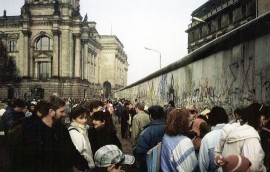
Twenty years on from the collapse of communism in eastern Europe, some of the stories of the time are now coming out. The British Foreign Office has published some papers that were written at the time of the reunification of Germany, and they throw an interesting light on events of the time. (Read a report in the Financial Times here.)
What is particularly striking is the mismatch between British and French attitudes on the one hand and German aspirations on the other. Post-war Germany had learned to live without nationalism, so it seemed, a state of affairs that Britain and France assumed could continue indefinitely.
But in fact, when the opportunity arose, there was great and even sentimental enthusiasm for unification once again. As Mrs Thatcher’s adviser Charles Powell wrote, “After decades of cautious and sober diplomacy . . . they are in the driving seat and Toad is at the wheel.”
The economic terms of reunification were hopelessly optimistic yet quickly became the political orthodoxy. The only party to object to them, the Greens, were punished heavily in the general election of 1990. Nationalism is a powerful force.
Of course, the German political leadership was well aware of this and became a powerful champion of renewed efforts to unite Europe, from the Maastricht treaty onwards.
“I reaffirm what Thomas Mann stated as long ago as 1952,” said German Foreign Minister Hans-Dietrich Genscher in February 1990, “we want a European Germany, not a German Europe.”
But within the new Europe, the new Germany should be a country like any other, and no longer peculiarly subject to the disciplines and burdens of history. Europe is still slowly and with difficulty moving along this path, but it remains nonetheless the right direction in which to go.
P.S. I like the reference to Mr Toad: is this what was meant by the wind of change?
